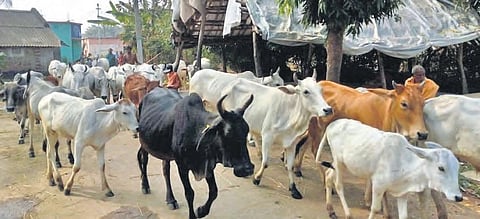

+Ve CUTTACK On a designated day every week Suresh Chandra Sahoo hangs up his lawyer’s robe and heads out to the pastures, herding the entire cattle of his village Tentuliragadi under Tigiria block of Cuttack district to graze on the lush green grass fields. He has been doing it for the last five years. And, he is not the only one. Every villager turns a cowherd for a day in a unique tradition that was born out of necessity but has turned into a community exercise furthering unity among the people.
The resident villagers are not the only ones to do the job, those who are working outside too come back once a week to take turns in grazing cattle. Home to 600 people of 96 families, the village has almost every family rearing one or more cows. Villagers, who are mostly farmers, have been rearing cattle alongside for generations to address their dietary needs as well as having a sustainable income through thick and thin. A problem emerged when the new generations armed with good education and training moved out to the cities for jobs and professions.
There were a few to manage the large number of cows, particularly arranging fodder for them. At present, cattle population at Tentuliragadi village is over 500. Since arranging grass and fodder daily was not feasible, villagers had hired two cowherds from the local Gauda community to graze the cattle in the land near their village. The cowherds were paid bartan (an annual contractual payment in kind of paddy) from each household.
However, after some time the cowherds refused to do the job leaving the villagers to fend for themselves. Unable to find an alternative, locals held a meeting and decided that every villager, irrespective of his social or job status, will graze the cattle once in a week. It was agreed upon that three villagers wi l l form a group which will take the cattle to graze and the members will change on a daily basis. There has been no break in this tradition since 2015, Sahoo said. Government employees are allotted the grazing job on Sundays and government holidays. “This is a community work and I am happy to be doing my part. I take cattle to the pasture land at 10 am and return to the village as the dusk sets in” said Sushant Kumar Khatua, a teacher.